By Dr Jennifer Jomafuvwe Agbaire, Research Associate at the School of Education, University of Bristol
Originally published on Bristol.ac.uk
“Those young students can just talk anyhow. If you really want to know about university admission in Nigeria, ask those in charge.” Just before I set out to begin my doctoral research, I got strong forms of this proposition from colleagues.
It was not surprising that previous research on the topic scarcely included students.
Fast-forward to several years and a PhD award later, I was organising an ESRC-funded exploratory impact event to share my doctoral research findings from students with ‘those in charge’. Yes indeed, I had defied the popular convention and gone ahead to explore Nigeria’s university access system through the lived experiences of students who are subjected to it.
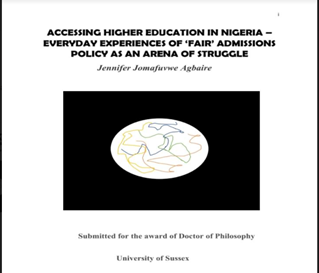
Globally, higher education is increasingly invoked in the imperatives for equity, inclusion, and development. I was a lecturer in a renowned Nigerian university who had become acutely aware of the persistent higher education access challenge in the country, and the widening disparities in access patterns. The public’s indignation leading to widespread protests by students, applicants and parents did not make it easy to be unaware of the situation anyway. Almost two million were applying to university each year but less than a quarter of eligible candidates were gaining a place. Yet, Nigeria is said to have the most comprehensive and rapidly expanding higher education system in Africa.
My doctoral research was partly a journey to indulge some of my overarching convictions: young people’s experiences are valid and legitimate. They are capable of articulating these experiences and the conditions that produce them in ways that can provide important problem-solving insights. More and more of their voices and stories need to be heard, particularly by those who contribute to policies about their lives. This is especially in many Global-South contexts, and perhaps elsewhere, with the ‘cultural’ tendency to over-value seniority and characterise it as the highest or sole measure of ‘wisdom’ and ‘credibility’. In these contexts, young people are more often described in terms of naivety, dependency and even truancy than they are equally positioned as discerning and deserving of an audience.
My research used focus groups with students in both regions of Nigeria – north and south – who had recently got admitted to university, and individual interviews with those who had applied (often many times) but did not get admitted. Their stories deeply implicated the existing national quota-based policy for equitable admissions to higher education in Nigeria, including its embedded assumptions and implementation processes. Their experiences painted a troubling picture of how these were reinforcing ethnic hierarchies, contributing to entrenched gender discrimination, reproducing class structures and in effect, sustaining social and educational inequalities.
Policymakers can be disconnected from the realities of the subjects of policy. They can be unaware of how both policy and process might be producing unintended negative consequences. I published a journal article based on my preliminary analysis of my research findings. I have also lined up a series of other articles to publish based on further analysis from my doctoral thesis… But academic research findings, particularly in Global-South countries like Nigeria, hardly ever reach policymakers and top stakeholders who have the responsibility, authority and power to influence decision-making and undertake policy actions towards change. So, with the exploratory Impact Acceleration funding, I set up an event with a view to overcoming this hurdle.
The event took place in August,2021. It was a virtual ‘roundtable’ designed as a two-day interactive workshop via Zoom. Through the event, I aimed to share my research findings, facilitate dialogue about university access policy reform and explore ways to build a collaborative network of stakeholders towards sustainable change in the present system. The event brought together key higher education policy-making stakeholders across Nigeria. These included university Registrars, Deputy Vice-Chancellors and Admission Officers from the country’s six geopolitical zones as well as Directors from the Nigerian National Universities Commission (NUC). It also featured two guest keynote presentations by Professor Mairead Dunne, who was my doctoral supervisor, and Chief Mojisola Ladipo, former Registrar of the University of Ibadan.
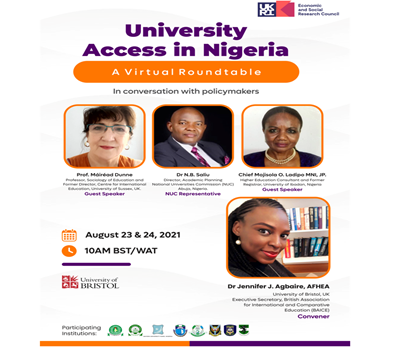
Attendees received an information sheet and a research findings brief prior to the event but it was the initial reaction in the opening session of the event that notably set the scene for how we would shape the conversation for the rest of the workshop – I presented the research overview, outlining the rationale and methods, and the immediate hint of scepticism from many of the attendees was unmistakable. This was layered with some disappointment that in other words would sound like, “Really?! You intend to make arguments based on what you have gathered from students? Phew, students!!!”
At that moment, the mandate for the event became even clearer to me: beyond ‘hearing’ the voices of young students through my research, this event must aim to move top-level stakeholders into a space where they are open to actually listening. This means starting the conversation with them – and in ways that they too can become ‘champions’ who keep it going beyond this space – on taking young people’ voices seriously and acting on the insights that their experiences provide.
Two things came through as incredibly important in moving us this step further during the event:
- Reinforcing the idea that this is not a judgmental space or a ‘witch-hunt’. Policy-makers and top-level management are constantly on the ‘hot seat’, responsible to an unrelenting public who rightly demand accountability. Nothing perceived as resulting from incompetence or failure on their part is addressed without literally tearing them apart if possible. My experience in Nigeria is that they widely receive blame for every social problem. The pressure from this can make them build a near-impenetrable wall of defence for self-preservation. The call to listen needs to go both ways – acknowledging the vulnerabilities of top-level stakeholders and working with them while they navigate these as well. To do this, I demonstrated throughout the event that this was about a genuine focus on problem-solving, a collaborative space of mutual learning and sharing and brainstorming. It was interesting to observe that the use of the language of ‘improvement’ created a turning point that contributed to breaking down the barriers of their ‘walls’. They embraced this as against language that focused on elements of failure, competition, blame and shame.
- Insisting against the rhetoric of Western /Global-North ‘superiority’. After the first Guest Keynote speech at the opening of the event, many attendees reacted with visible relief. One of them voiced why: “I was kind of apprehensive and sceptical before the presentation because usually, people are made to believe that everything Western is superior to everything African and we are made to believe that we are not even doing anything”. Well, contrary to peddling this erroneous narrative, I had located the Nigerian higher education access challenge within global antecedents. The first guest speaker complemented this particularly by using very illustrative examples from the UK. These showed that ‘developed’ societies and their policymakers continue to grapple with similar issues albeit in context-specific ways. This ushered in a sense of collective experience. It served as another gateway to a more relaxed atmosphere where attendees became more amenable to letting down their guard and genuinely engaging with the issues in the Nigerian context.
By the end of Day 2, we agreed that the event had been an invigorating experience. The visible shift in our collective understanding of the issues was refreshing as was the active brainstorming of forward-looking and feasible solutions that this led to.
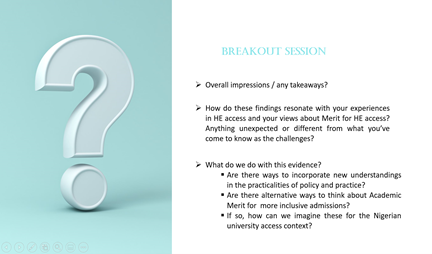
Afterwards, the feedback has been highly positive. The keenness that the attendees and partners have been demonstrating to keep the conservation going is illuminating and humbling. I look at the idea-sharing Padlets I created for attendees to share thoughts during the event. I see that every potential policy reform pathway we collectively brainstormed seems to have a potential practicality blockage connected to Nigeria’s contextual realities.
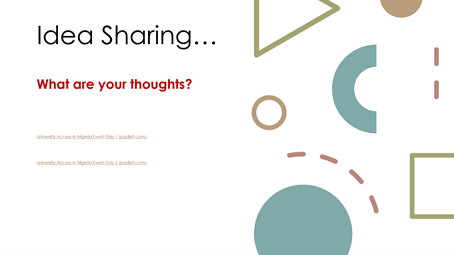
So, addressing the Nigerian higher education access challenge is certainly as complex as the challenge itself…but listening is striving and taking one small step at a time. This, we are proudly achieving.
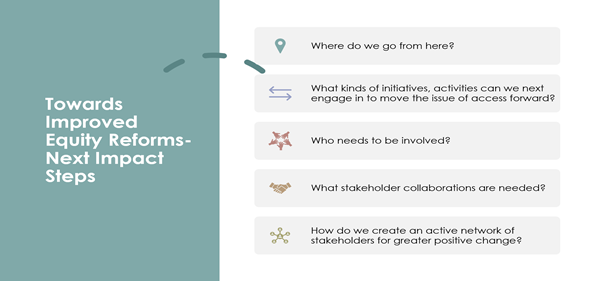
Thanks to the students who graciously shared their stories with me.